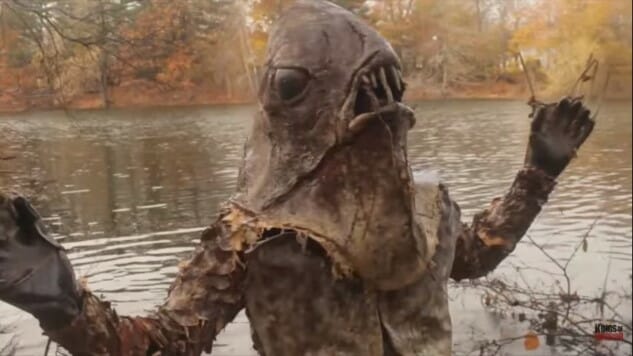Bad Movie Diaries: Don’t Let the Riverbeast Get You (2012)
Photos via Amazon Prime Video
Jim Vorel and Kenneth Lowe are connoisseurs of terrible movies. In this occasional series, they watch and then discuss the fallout of a particularly painful film. Be wary of spoilers.
Ken: Jim, I went into this week’s feature certain I would be prepared to give it a critical drubbing. Yet, I am here to say that although this unquestionably counts as a bad movie, Don’t Let the Riverbeast Get You is perhaps the most sincere effort we’ve yet tackled here on Bad Movie Diaries. And I would also be remiss not to give a shout out to our Paste Movies colleague Dom Sinacola for pointing us in the direction of the prolific works of today’s auteur, writer/director/star Matt Farley.
Jim: Ken, this movie is unique. It’s the lowest budget thing we’ve watched during any installment of Bad Movie Diaries—actually, I kind of assume it’s the lowest budget thing we ever will watch during an installment of this column—but it may also be the “best” movie we’ve watched. Or at least the best one, as Obi Wan would no doubt say, “from a certain point of view.” At the very least, it is nothing but unique. I should note though, that although we’ll be talking a whole lot about Matt Farley in this post, Don’t Let the Riverbeast Get You is actually directed and co-written by Farley’s producing partner Charles Roxburgh. Farley just happens to be THE FACE of the duo, it would appear. Note: Don’t Let the Riverbeast Get You is available in full, for free, via YouTube, in glorious 480p.
Ken: And I need to say right up front that he’s an enthusiastic face. At the end of the credits of Riverbeast, one of the items entreats you to “CALL NEIL STUART,” the hero of the film, and provides a phone number. My sister-in-law dialed it and I’ll be damned if Farley, who plays Neil, didn’t answer by the third ring and was game to roleplay his character for a bit. After my sister-in-law passed the phone to me, I asked him a few quick questions about his work. He puts his number in many of the things he produces—films and the more than 19,000 songs he’s uploaded to YouTube and Spotify—and said Riverbeast, like all his films, is the result of his close friends and family members sacrificing time and effort to make these movies. When actors don’t show for shoots, he says it is common practice to just rewrite the script on the fly. All in all, he said this took about a month’s worth of shooting spread out across a few months.
Ken: For the record, he said he gets maybe four or five calls like mine a year.
Jim: That is truly amazing, Ken.
Ken: But we haven’t even begun with the premise of this harrowing monster movie. Why don’t you tell us about it?
Jim: Okay. Don’t Let the Riverbeast Get You is meant to essentially be a parody or satire of ’40s and ’50s-era cheapo monster movies, a la the Creature From the Black Lagoon sequel The Creature Walks Among Us in particular. Farley plays Neil, a “superstar tutor” who has been living in disgrace away from home ever since he had an encounter with the fabled “Riverbeast” three years earlier. Suffice to say, no one believed his wild stories about the monster living in the woods/river, and the public backlash fueled by a muckraking local journalist caused his former fiancée to leave him at the altar and pretty much ruined his life. The film picks up as Neil returns to town, where literally everyone immediately picks up where they left off, alternatingly mocking him for his Riverbeast encounter and praising his godlike, preternatural tutoring abilities.
Ken: It was really hard for me to figure out how satirical or how earnest this work was, and indeed, what the time period was supposed to be. A few characters are clearly modeled off that clean-cut ’50s-type era and the dialogue is all incredibly stilted and unnatural. But there are clearly some things which are 100% meant to evoke baffled laughter, such as the father of one principal character who is described as a “former professional athlete,” with no elaboration on what sport he played. Over the course of the film, he’s shown playing three or four different sports. It’s one “wtf?!” detail in a movie avowedly full of them.
 The world’s greatest pro athlete and the world’s greatest tutor, together in one place.
The world’s greatest pro athlete and the world’s greatest tutor, together in one place.
-

-

-

-

-

-

-

-

-

-

-

-

-

-

-

-

-

-

-

-

-

-

-

-

-

-

-

-

-

-

-

-

-

-

-

-

-

-

-

-

 A bridal throne fit for a queen.
A bridal throne fit for a queen. Merrily sprinkling kitty litter on the corpse of the Riverbeast.
Merrily sprinkling kitty litter on the corpse of the Riverbeast.






































